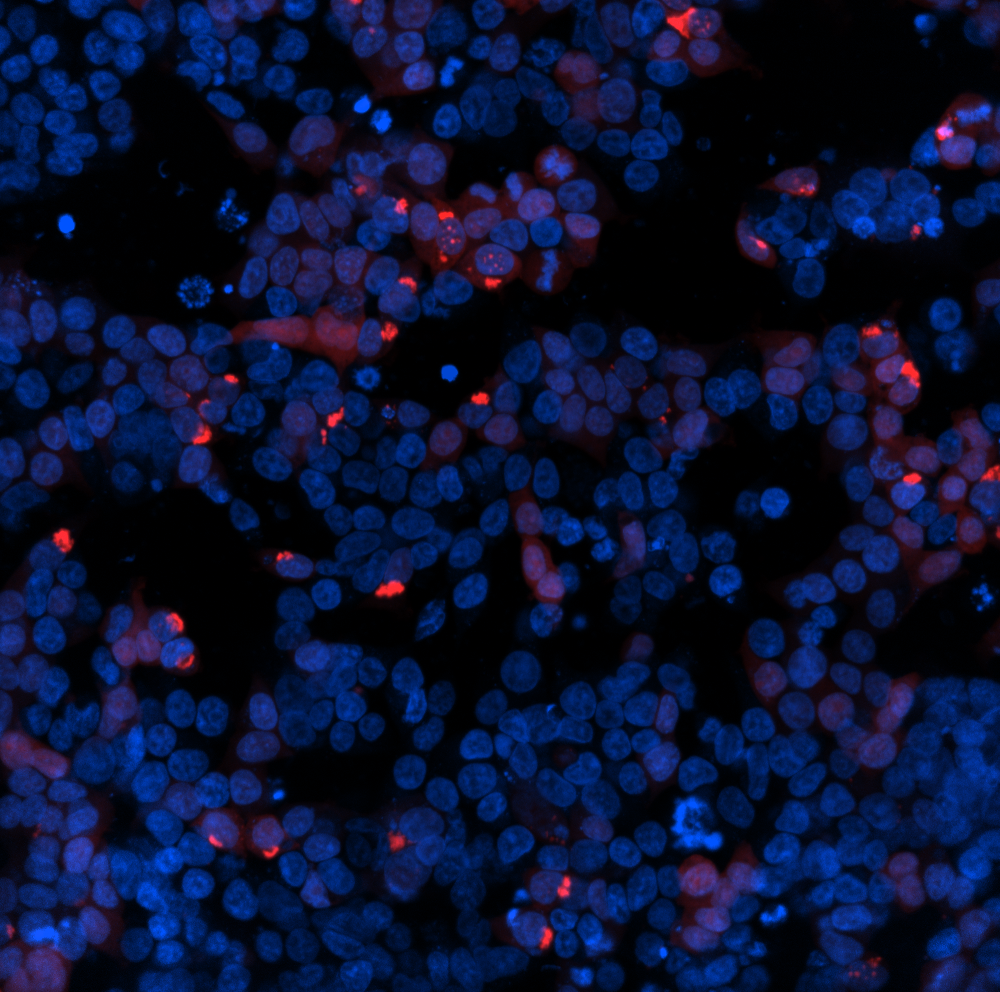Reviewed by Danielle Ellis, B.Sc.Aug 22 2023
Viral genetic remnants found naturally in the human genome may influence the development of neurodegenerative diseases. DZNE investigators reach this conclusion based on cell culture research. They published their findings in the journal Nature Communications.
 Genetic remnants of viruses that are naturally present in the human genome could affect the development of neurodegenerative diseases. DZNE researchers come to this conclusion on the basis of studies on cell cultures as shown in this microscopy image. Image Credit: DZNE/Vorberg Lab (S. Heumüller).
Genetic remnants of viruses that are naturally present in the human genome could affect the development of neurodegenerative diseases. DZNE researchers come to this conclusion on the basis of studies on cell cultures as shown in this microscopy image. Image Credit: DZNE/Vorberg Lab (S. Heumüller).
According to them, such “endogenous retroviruses” could contribute to the spread of abnormal protein aggregates in the brain, which are hallmarks of certain dementias. As a result, these viral relicts could be therapeutic targets.
It has long been suspected that viral infections contribute to the onset and progression of neurodegenerative diseases. DZNE researchers' laboratory studies now point to a mechanism that, while related to viruses, does not necessitate infection by external pathogens. The culprits, according to this study, are “endogenous retroviruses” that are normally present in the human genome.
During evolution, genes from numerous viruses have accumulated in our DNA. Most of these gene sequences are mutated and normally muted. However, there is evidence that endogenous retroviruses are activated under certain conditions and contribute to cancer and neurodegenerative diseases. Indeed, proteins or other gene products derived from such retroviruses are found in the blood or tissue of patients.”
Ina Vorberg, Professor, University of Bonn
Ina Vorberg is also the research group leader at DZNE.
Experiments With Tau Aggregates
Vorberg and coworkers from Bonn and Munich followed this trail. The investigators used cell cultures to simulate the situation in which human cells produce specific proteins from the envelope of endogenous retroviruses. This involved HERV-W and HERV K, which are both present in the human genome but are generally dormant.
HERV-W is activated in multiple sclerosis, and HERV-K is activated in the neurological disease “amyotrophic lateral sclerosis” (ALS) and frontotemporal dementia (FTD), according to research. Vorberg’s team discovered that viral proteins aid in the transport of tau aggregates from cell to cell. Tau aggregates are small protein clumps found in the brains of people suffering from neurodegenerative diseases such as Alzheimer’s and FTD.
Certainly, conditions in the brain are much more complex than our cellular model system can replicate them. Nevertheless, our experiments show that endogenous retroviruses can influence the spread of tau aggregates between cells. Endogenous retroviruses would thus not be triggers of neurodegeneration, but could fuel the disease process once it is already underway.”
Ina Vorberg, Professor, University of Bonn
Viral Transport Mediators
The current research and earlier studies by Vorberg’s team suggest that viral proteins serve as transport mediators for tau aggregates because they insert into the cell membrane and the membrane of so-called extracellular vesicles: These are small fat bubbles that are naturally secreted by cells.
“For the transport of tau aggregates from cell to cell, we see two pathways in particular. Transfer between cells that are in direct contact, and transport within vesicles that act as cargo capsules, so to speak, and pass from one cell to another to eventually merge with it,” Vorberg details.
In both scenarios, membranes have to fuse. Proteins from the envelope of viruses can promote this process. That’s because many viruses are adapted to fuse with host cells. This happens by means of special proteins that viruses carry on their surfaces. If precisely these proteins are incorporated into the cell membrane and the membrane of extracellular vesicles, it is understandable that the tau aggregates then spread more easily.”
Ina Vorberg, Professor, University of Bonn
Starting Points for Therapy
In the course of the natural aging process, the regulation of genes can change - originally “dormant” endogenous retroviruses could be “awakened” as a result. Indeed, the symptoms of most neurodegenerative diseases do not manifest until older age. This raises two conceivable approaches to therapy.
Vorberg notes, “On the one hand, one could try to specifically suppress gene expression, that is, to inactivate the endogenous retroviruses again. That would get to the root of the problem. But you could also start elsewhere and try to neutralize the viral proteins—for example, with antibodies.”
Searching for Antibodies
In the opinion of the researchers, dementia patients with tau aggregates likely carry increased amounts of such antibodies. If it were possible to isolate these and reproduce them using biotechnological methods, it might be possible to develop a passive vaccine. Thus, in collaboration with DZNE colleagues in Berlin and Bonn, Vorberg’s team aims to specifically search for such antibodies in patients.
In addition, the scientists are considering antiviral drugs. In cell culture, they have already found that such agents can actually stop the spread of protein aggregates. “This is another approach we intend to pursue,” concludes Vorberg.
Source:
Journal reference:
Liu, S., et al. (2023). Reactivated endogenous retroviruses promote protein aggregate spreading. Nature Communications. doi.org/10.1038/s41467-023-40632-z.